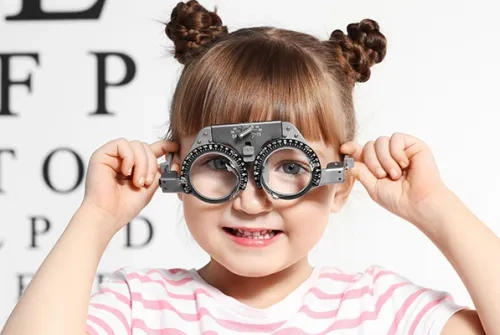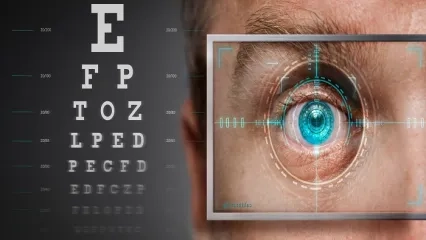Alo Yeditepe
Alo Yeditepe
Eye Problems Increase as Children's Digital Screen Time Extends
Digital screens have become a part of ur children’s lives an education. With the increased screen time, cildren spend less time outdoors and this puts them at the risk of developing myopia. Yeditepe University Hospitals Ophthalmology Specialist Assoc. Prof. Dr. Özge Yabaş Kızıloğlu pointed out that increased screen time paves the way for multiple problems, ranging from digital eye strain to diplopia.
Noting that the incidence of myopia, a refractive error that can cause serious eye problems such as cataracts, glaucoma and retinal diseases, has increased dramatically in children in the last 30 years, Assoc. Prof. Dr. Yabaş Kızıloğlu pointed out that spending less time outdoors and more time in front of a screen is one of the most important reasons why this situation came out.
Stating that many studies conducted with children aged 1-18 show that time spent on a digital screen has increased throughout the world due to the Covid-19 pandemic, Yeditepe University Hospitals Ophthalmology Specialist Assoc. Prof. Dr. Özge Yabaş Kızıloğlu said; “Increased screen time paves the way for an eye condition called digital eye strain which occurs during or after using a screen”.
Increased Screen Time Causes Myopia to Start Early!
Stating that while this situation may cause eye isues to uncover themselves, it can also cause existing problems to worsen, Assoc. Prof. Dr. Özge Yabaş Kızıloğlu provided the following information: “Pre-existing refractive errors that did not cause any complaints may show themselves more easily due to increased screen time and lead to complaints. For example, while a child with hyperopia can tolerate it without complaint, looking at screens for long periods of time may cause fatigue of the adaptation muscles that allow the eye to focus close, and may cause symptoms such as eye strain, eye and headache in the child. Uninterrupted staring at the screens for a long time can also cause dry eyes, causing complaints such as stinging, burning, and the need to rub the eyes. Rubbing the eyes can cause astigmatism to appear or progress. However, there is an increased risk of myopia, especially since hand-held digital screens such as smartphones and tablets are viewed from very close (20-40 cm) distance. It has also been reported that increased screen time may cause early onset of myopia”.
“Children Forget to Blink”
Stating that in some studies, it has been found that there may be a relationship between the prolongation of screen time in children and the development of inward diplomia, Assoc. Prof. Dr. Özge Yabaş Kızıloğlu also provided the following information; “Another condition associated with increased screen time is dry eyes. Blinking is a protective reflex that helps moisten the surface of the eye. Blinking can be "forgotten" when looking at the screen intently for a long time, causing the tear film that protects the eye surface to evaporate and the surface of the eye to dry. In the studies, it has been shown that the number of blinks decreases with the increase in concentration, especially when playing digital games, and the blinking is not done fully”.
How Long Should Screen Time Be for Children?
Pointing out that this situation negatively affects all individuals in childhood, if screen time is not limited at very young ages, it will trigger the early onset of myopia, Assoc. Prof. Dr. Özge Yabaş Kızıloğlu gave the following information about the risks that may arise:
“After the onset of myopia, it is a refractive error that gradually increases with the growth of the child. The age of onset of myopia is the most important determinant of severe myopia in advanced ages. High myopia increases the risk of many eye diseases such as cataracts, glaucoma and retinal detachment. Therefore, children's screen time should be strictly limited. The generally recommended limits are as follows: Under 2 years: Zero screen use, except for video calls with family members and friends. Children between the ages of 2-5 should have a maximum of 1 hour a day, and between the ages of 5-17, a maximum of 2 hours a day excluding homework”.
These Signs Show that There May Be A Problem With Your Child’s Eyes!
Underlining that if complaints such as pain in the eyes, stinging and burning, frequent blinking, headache, redness of the eye, blurred vision, double vision occur, it is necessary to consult an ophthalmologist, Yeditepe University Hospitals Ophthalmology Specialist Assoc. Prof. Dr. Özge Yabaş Kızıloğlu also stated; “However, even if children spend hours in front of the screen, they may not realize that their eyes are tired and may not express any complaints. For this reason, even if there are no complaints, it is necessary to have regular eye checks”.
Parents Should Heed These Warnings!
Assoc. Prof. Dr. Özge Yabaş Kızıloğlu offered the following suggestions to parents:
“Parents should encourage at least 1-2 hours of outdoor time a day, as exposure to natural light benefits eye development. Scientific studies show that time spent outdoors provides protection against myopia. In addition, parents should create “screen-free” periods where their children will be away from screens for a certain period of time during the day. It is necessary to take frequent breaks from screen use and to use the total determined screen time by dividing it. Children should be reminded of this, as it is also very important to blink frequently when using digital screens. The distance between us and the computer screen should be as long as our arm's length and the position of the screen should be slightly lower than the eye. If the child is wearing glasses, the anti-reflective coating of the glasses prevents reflection and glare and reduces eye fatigue. Artificial tear drops can be used in the presence of dry eye symptoms. Also, regular eye examinations should not be missed. In this way, it will be possible to minimize and treat the problems. Especially if children have increased their screen use during their free time during the summer holidays, we recommend that they have their eyes checked before the schools start.”
About
Faculty and Year of Graduation:
Istanbul University Faculty of Medicine, 2000
”
See Also
- Damages of Fake Sunglasses
- What is Cataract? Symptoms and Treatment
- Get Your Child's Eye Examination Done Before They Go to School!
- A Common But Little-Known Disease: Retinopathy of Prematurity (ROP)
- Pay Attention to the Flashing Light in the Eye!
- Medication Administration to the Eye
- Glaucoma
- The Danger to the World: MYOPIA
- Are Flies Flying Before Your Eyes?
Alo Yeditepe




